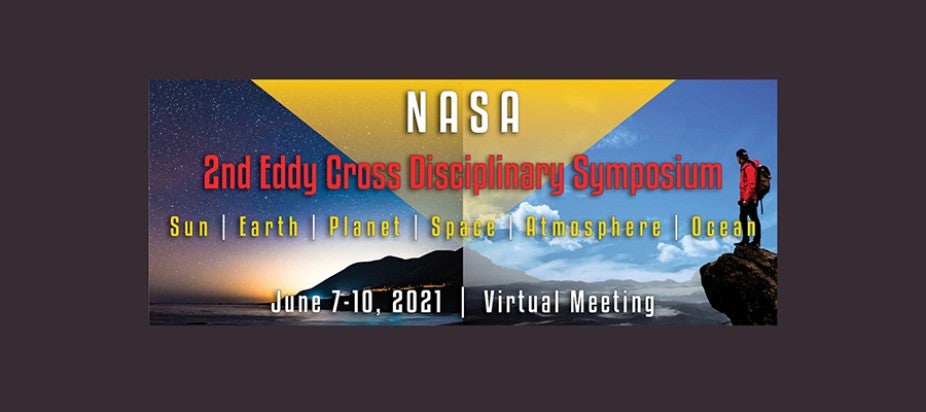2nd Eddy Cross Disciplinary Symposium

6:00 – 6:00 pm MDT
About
In coordination with the NASA Living With a Star Program, we are pleased to announce the 2nd Eddy Cross Disciplinary Symposium to be held virtually from 7-10 June 2021, with the goal of bringing together diverse groups from data science, and Earth and space sciences.
We live in a rapidly changing social and technological society, one that presents threats to our Earth systems. In turn, humanity faces global threats from Earth’s rapidly changing climate, globally transmitted disease, changing ecosystems and an unprecedented dependence on electrical and electronic infrastructure. New phrases such as “climate change”, “severe weather events”, and “space weather” are now in common use.
Our global vulnerabilities have prompted massive investments in research across the Earth and space sciences in an attempt to understand how to adapt as a society to our complex surroundings. The result has been a deluge of information coming from new instruments in space and on the ground, across laboratories, projects, and individuals, presenting a grand challenge to the scientific community to make sense of diverse, intricately connected and complex datasets. Technological advance has also brought immense capabilities for the investigation and discovery of nature, holding promise across Earth science, astro- and helio-physics alike.
Goal
We wish to identify and promote novel opportunities for budding scientists, to take advantage of powerful new techniques from computational and data science, including machine learning and AI techniques.
Join a community of scientific facilitators for an uncommon opportunity to advance cross-disciplinary conversations and research into the areas of Sun-Earth relations, weather-climate connections, and novel star-planet interactions. The community will include:
- Early career and senior researchers
- Data scientists and machine learning practitioners
- Domain and cross-disciplinary scientists
Poster Presentations - Abstract Deadline April 30, 2021
As with many scientific meetings and conferences, the poster sessions will be a key communication platform. Posters will be accessible during the entire meeting, but will be presented on Monday, June 7, 2021 from 1:00 - 3:00pm Mountain Time using the web-based aMuse!iPosterSessions platform. Each poster presenter will create a digital, interactive virtual poster using the iPosterSessions platform utilized by AGU for the past four years. All poster presenters will receive additional information on creating a virtual poster presention via email by Friday, May 7, 2021.
The deadline to create and publish your virtual poster is Friday, May 28, 2021.
Scientific Program
The 2nd Eddy Cross Disciplinary Symposium will host both the Scientific Program and Poster Session on the aMuse!iPosterSessions web-based platform. Each day will consist of:
- Scientific talks from 8:00 - 11:30am Mountain Time
- Afternoon sessions from 1:00 - 3:00pm Mountain Time
The afternoon sessions will include a poster session on Monday, June 7 and parallel breakout sessions on June 8 - 10.
Most of the sessions will use Zoom or Zoom Webinar. All attendees will be offered the option of using a web browser rather than the Zoom app.
Only registered attendees will will be able to access the event. All registered attendees will receive an email on Monday, May 31, 2021 that will include detailed information on the Symposium and the link to the live Scientific Program platform.
Future Symposium Information
In 2022 we will convene a follow-up in-person meeting in Vail, Colorado, to assess collaborations and to refine further the cross-disciplinary research areas of particular promise.
Symposium Contacts
- Kendra Greb, UCAR/CPAESS Program Administrator - kgreb@ucar.edu
- Phil Judge, Eddy Symposium Steering Committee Chair - judge@ucar.edu
- Sharon Anderson, Prestige Global Meeting Source Meeting Planner - sanderson@meetprestige.com
Eddy Symposium Steering Committee
- Phil Judge, Committee Chair, NCAR High Altitude Observatory
- Madhulika Guhathakurta, NASA Headquarters
- Ankush Bhaskar, ISRO, Vikram Sarabhai Space Centre
- Rajesh Gupta, Department of Computer Science and Engineering, University of California, San Diego
- King-Fi Li, Department of Environmental Sciences, University of California, Riverside
- Dan Marsh, NCAR Atmospheric Chemisty Observations and Modeling Laboratory
- Ryan McGranaghan, ASTRA
- Erika Palmerio, Space Sciences Laboratory, University of California, Berkeley